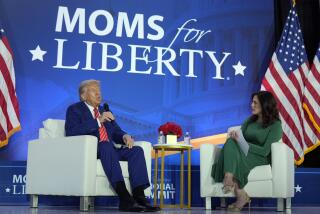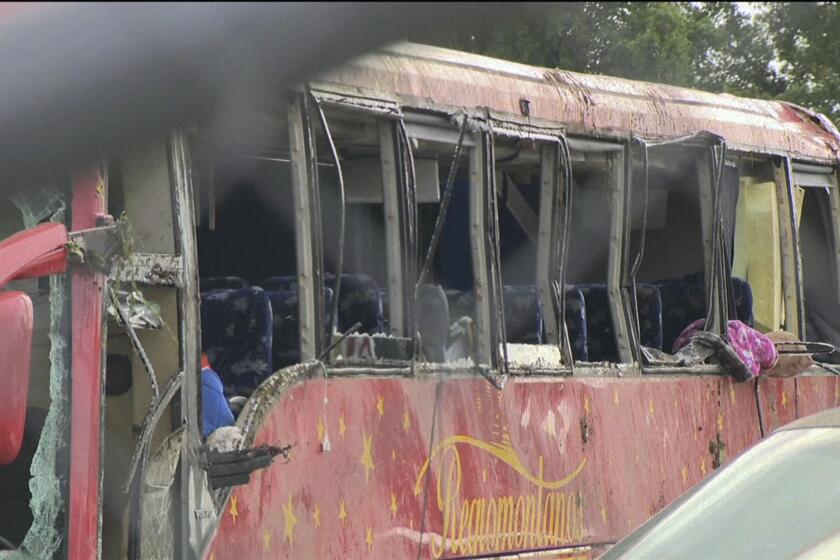New Soviet Federal Treaty Completed : Reform: It launches a transformation from a centralized empire to a looser federation of sovereign states. The signing will strengthen Gorbachev’s hand.
Soviet President Mikhail S. Gorbachev, emerging weary but triumphant from 12 hours of tough negotiations, announced early Wednesday that a new federal treaty designed to hold together most of the country’s republics is finally complete and ready for signing.
The agreement, known as the Union Treaty, launches a historic transformation of the Soviet Union from a tightly centralized empire to a looser federation of sovereign states bound together on a voluntary basis. The treaty, in effect, lays a new constitutional foundation for the country.
The treaty’s signing, which officials said should come in the next three months, will give Gorbachev’s reforms a major boost by smoothing the Kremlin’s relations with the country’s 15 restive republics and clarifying the respective powers of the federal and local governments.
The treaty’s completion also strengthened Gorbachev on the eve of his expected battle today at a plenary meeting of the Communist Party’s policy-making Central Committee, which is to debate the party’s future.
Gorbachev, who is the party’s general secretary, reportedly plans to call for the committee’s endorsement of a new party platform promoting “democratic, humane socialism”--a phrase that party hard-liners see as the abandonment of their Marxist faith.
Twelve prominent Communist conservatives, including high-ranking military figures, in a toughly worded statement this week blamed party reformers--and, by implication, Gorbachev himself--for bringing the country to ruin, and they called on the army and other “healthy forces” to save it.
The Soviet president appeared unperturbed, however, as he spoke on Soviet television at about 2 a.m. Wednesday, proclaiming his vision for the Communist Party’s “program for the ‘90s.”
“We’ve finally reached agreement,” Gorbachev said at an elegant government dacha in Novo-Ogaryovo, a Moscow suburb where he and the leaders of nine republics have been meeting periodically for negotiations since April. “And today we can say that the work on the Union Treaty is completed.
“I won’t say that this discussion has been easy,” the Soviet president added. The dark bags under his eyes and the shadow of stubble on his cheeks and chin bespoke the long ordeal of stormy arguments and tedious haggling over taxes and the number of seats each republic and autonomous region will have in the new Parliament.
But obviously heartened by this climactic negotiating success with republic leaders, Gorbachev seemed to feel that he was finally developing the momentum that could carry the Soviet Union out of its profound crisis.
“This is a big day, a big event of great importance, and great progress (has been made) toward mutual understanding and a new Soviet Union,” Gorbachev said.
The six Soviet republics that refused to participate in the negotiations--Latvia, Lithuania, Estonia, Armenia, Georgia and Moldova--are still invited to sign the treaty, Gorbachev said.
“The Union Treaty is open to all republics,” he said. “A process is under way.”
Armenia’s president, Levon Ter-Petrosyan, took part in the final talks but said later through a spokesman that Armenia’s future will be decided in a September referendum on independence.
Grigory I. Revenko, the president’s adviser on the Union Treaty, said in an interview Wednesday that the Kremlin is willing to delay the signing of the treaty for weeks in hopes that public pressure will mount in some of the recalcitrant republics and that they will then choose to sign.
Those republics that opt for full secession, Revenko said, will have to go about it according to Soviet law, which requires a five-year separation period. Separatist leaders in the Baltic republics have broached the possibility of pursuing political independence but signing purely economic agreements with the Soviet Union.
“No one can be held on a chain to the Soviet Union,” said Revenko, his voice hoarse with fatigue. “We have to take into account the lessons of Yugoslavia and our own lessons. Only through consensus and mutual understanding can we begin to move this country.”
Under the Union Treaty, in what would be called the Union of Soviet Sovereign Republics, republics would be declared fully sovereign but then formally delegate some of their powers to the center in such key spheres as defense, transportation and nuclear power.
In contrast to the old days of near-total Kremlin dictatorship, the republics would control their own resources and decide their own social and economic policies, including such touchy issues as the private ownership of land.
The treaty also freezes all current borders, allowing for no alterations, and emphasizes the creation of a “common economic space” with a single currency, free trade and an absence of tariffs within Soviet territory.
The republic leaders reached a key compromise in the late night negotiations on one of the main economic snags they had hit--whether there should be federal taxes or only republic levies.
Russian Federation President Boris N. Yeltsin had pressed hard for the republics alone to control taxes, but Revenko said the consensus had been “that if this is a federation, it should have federal taxes.”
The compromise, he said, would provide for federal taxes but give the republics the right to oversee how the central government spends tax money.
The final formula was still being worked out Wednesday but appeared to mark a major concession on Yeltsin’s part.
“Any treaty is always a system of concessions,” Revenko said. “Concessions were made to Russia, and Russia made concessions.”
Marshal Dmitri T. Yazov, the Soviet defense minister, attended the Novo-Ogaryovo session, prompting speculation that the sensitive question of the fate of nuclear weapons in outlying republics might be under discussion.
But Revenko dismissed the suggestion, saying there had never been any question that nuclear weapons could be parceled out to the republics.
“This is not just a Soviet affair,” he said. “It involves global interests, and no one would tolerate it.”
The session also resolved the last disputes on representation in the federal Parliament, makeup of a new constitutional court and the status of the country’s many autonomous regions.
Even with the treaty now apparently in hand, however, Revenko warned that it was premature to celebrate a great victory.
The completion of the treaty “was an extraordinary event, of very high significance,” Revenko said, “but what keeps me from real ecstasy is my homeland, the Ukraine.”
Although Ukrainian leaders have declared that they are pro-treaty, the Parliament in Kiev has put off discussion of the treaty until autumn, and the rise of nationalism in the breadbasket republic of more than 50 million people may prompt its leaders to reject the treaty and torpedo all of Gorbachev’s plans.
Even if the Ukraine accepts the draft and the Union Treaty is signed, Revenko acknowledged that this will only mark the beginning of a long process of further negotiation and interpretation.
He compared the upcoming process to the writing and then the gradual amending of the United States Constitution.
“We’re going through now what the United States began going through 200 years ago,” he said.
Next Step: What Will Republics Do?
Armenia: Will hold referendum in the fall on whether to sign Union Treaty, vote on independence from Soviet Union on Sept. 21.
Azerbaijan: Will sign Union Treaty, then hold its first popular election for president Sept. 8.
Byelorussia: Will sign Union Treaty and plans to hold popular elections for president, date not disclosed.
Georgia: Refuses to sign Union Treaty, elected nationalist leader Zviad Gamsakhurdia as president May 26.
Estonia: Has refused to sign Union Treaty. Voted overwhelmingly March 2 for independence from Soviet Union.
Kazakhstan: Will sign Union Treaty.
Kirghizia: Will sign Union Treaty.
Latvia: Has refused to sign Union Treaty. Voted overwhelmingly March 2 for independence from Soviet Union.
Lithuania: Refuses to sign Union Treaty. Declared independence March 11, 1990.
Moldova: Refuses to sign Union Treaty. Parliament proclaimed sovereignty June 23, 1990.
Russia: Will sign Union Treaty. Parliament declared sovereignty June 11, 1990.
Tadzhikistan: Will sign Union Treaty. Plans popular election after President Kakhar M. Makhkamov ends his term in 1995.
Turkmenistan: Will sign Union Treaty.
Ukraine: Said it will sign Union Treaty but public dissatisfaction is strong. Presidential election will be held Dec. 1.
Uzbekistan: Will sign Union Treaty. Plans popular election after President Islam A. Karimov ends his term in 1995.
More to Read
Sign up for Essential California
The most important California stories and recommendations in your inbox every morning.
You may occasionally receive promotional content from the Los Angeles Times.






